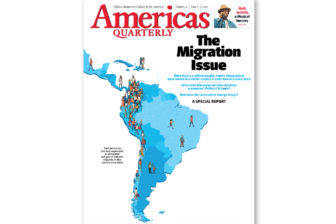This article is adapted from AQ‘s special report on migration
The Venezuelan refugee crisis may soon become the largest globally since World War II, different from anything Latin America has experienced before. Yet the exodus from Venezuela is unprecedented not only in size. Nearly 5 million Venezuelans have left their country and are trying to integrate into new societies at a moment when the gig economy has created a new reality for labor markets everywhere.
This interplay is producing similar stories in Bogotá, Lima, Santiago and other Latin American metropolises: the Venezuelan with a college or even a graduate degree who is driving an Uber, Lyft or Cabify to provide for his or her family. Or the Venezuelan student who dreamed about attending a university but is now riding a bike to deliver food for Rappi — the Colombian company launched in 2015 and valued at over $1 billion. According to Rappi, 30% of its more than 100,000 couriers around the world are migrants (the company does not disclose the exact number of Venezuelan workers for fears of fueling anti-immigrant sentiment).
At first, these may seem like tragic cases of wasted talent and missed opportunities. But a fuller picture should lead to a more nuanced conclusion.
According to reports, Rappi couriers in Colombia make from $20 to $30 in a 14-hour shift. That’s little money even for Colombian standards. Yet the hourly pay in the busiest part of the day is from $2.30 to $2.90 — double what workers on minimum wage make per hour. Also, unemployment in urban areas in Colombia has been above 10% for several years, and more than 45% of workers are informally employed — meaning better opportunities are scarce for everyone, not just migrants.
The alternative we had before — a world without Rappi, Uber and the like— wasn’t great either for foreign laborers forced to leave their countries. The gig economy is lowering the entry barriers to the labor market. It can provide more flexibility for refugees and migrants trying to integrate, potentially helping them gain access to higher-paying jobs.
However, these gains can only take hold if they are combined with policies to offset the gig economy’s downsides, such as volatile income and the lack of benefits.
A ladder or a trap?
Whether refugees become an asset or a burden depends on certain policies in host countries. For starters, without the right to work, foreigners can’t contribute to their receiving economies. Fortunately, most countries in Latin America are aware of this and have granted work authorization to millions of Venezuelan refugees, though in some places with more red tape than in others.
But the right to work alone doesn’t mean that refugees and migrants will find the “right” job — one where they can fully use their skills and get paid accordingly. After all, presumably, one of the reasons why highly qualified Venezuelans are driving in shared-ride apps such as Uber is that finding a job is hard.
Job markets are full of imperfections, with lengthy and costly matching processes between employers and employees. Before, a migrant or refugee would likely take whatever “traditional” full-time job came first, out of desperation to get any job regardless of whether it was a good fit. These full-time jobs would offer little flexibility and often require a medium- to long-term commitment. Consequently, a refugee would be underemployed for a long period, which could have detrimental consequences in subsequent job searches.
Gig economy jobs have the potential to change this dynamic, for a few reasons. First, the cost of entry is low. If you sign up, undergo a few checks, and own often inexpensive equipment — such as a bicycle for delivery services or tools for contractor apps —you can hit the ground running and find “a” job relatively quickly.
Second, gig economy jobs could offer more flexibility. If the end goal is to look for a job that is a better fit, migrants and refugees can devote time and resources to the search while still having some income. This is also an important aspect for migrants and refugees who are working on acquiring more skills, like language or vocational training.
Of course, gig economy jobs have several problems. Their workers might have volatile incomes and, in most cases, very limited access to benefits, such as health care insurance and private retirement funds. Frequently, available jobs have important safety issues.
So, what policies can mitigate these problems? The key is that, together with work permits, governments need to invest in extending safety nets for newcomers. This will be politically sensitive: the local population already faces deficient government services and will likely push back against fully extending them to migrants, especially to those undocumented. Yet some ideas out there could help.
One is offering conditional cash transfers for those working informally and formally, which would also reduce the income volatility of gig economy jobs. Another is unemployment insurance for migrants, capable of protecting those unable to cover very basic living costs. And of course, guaranteeing access to health care and education is critical to allow migrant parents to work while their kids are taken care of — including with food.
Can these new opportunities for migrants and refugees hurt local workers? Academic research shows that the evidence of migrants negatively affecting natives’ employment is thin, at best. This is mostly because foreigners and locals usually bring different skills to the labor market. If gig economy jobs can indeed help higher-skilled foreign laborers reach better positions, this would, in fact, reduce concerns of competition — although economists have not been able to empirically test this hypothesis.
Economists have demonstrated that refugees and migrants can provide remarkable growth opportunities for host countries. Now as the gig economy swiftly changes the labor market, policymakers must think outside the box to take full advantage of them.
—
Bahar is a senior fellow in the Global Economy and Development program at the Brookings Institution









